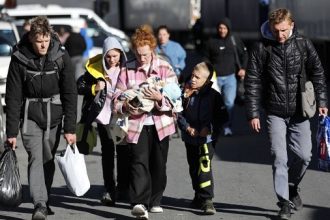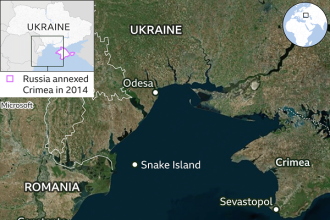Fans of Britain’s Chelsea football club were shocked to discover early last month that Russia’s war in Ukraine meant they could no longer buy tickets to the team’s matches or purchase Chelsea gear.
The reason: Chelsea’s owner, Russian oligarch Roman Abramovich, a close associate of Russian President Vladimir Putin, was slapped with Western sanctions barring him from profiting from his properties. The issue was soon resolved with an agreement that redirects team profits to victims of the Ukraine war.
Still, the disruption gave Chelsea fans the smallest of tastes of how Russia’s invasion of a neighboring country in violation of international law is having an impact on globalization.
In similar ways, Russian consumers of luxury European goods and American fast-food offerings are learning the lessons of what a growing number of international economists describe as the “deglobalizing” effects of the Ukraine war and Western efforts to punish Russia for launching it. So are families in developing countries dependent on Ukrainian wheat, and even German automakers whose supply chains for parts run through Ukraine.
But does the war portend the end of the post-Cold War era of heightened globalization? The decadeslong trend creating more interdependent economies has streamlined the production of goods even as it extended supply chains, shifted production to developing countries while extending prosperity to hundreds of millions, and created vast fortunes for businesses able to navigate the new global topography.
Some economists and historians point to proliferating news items – Moscow’s shuttered McDonald’s restaurants, rising bread prices in Tunisia and Bangladesh because of undelivered Ukrainian wheat, Europe’s newfound determination to wean itself from Russian energy sources, and Mr. Putin’s accelerated efforts to forge an alternative to the Western-led global economy – and conclude that indeed, globalization is down for the count.
But many others caution that while an era of globalization already in retreat is likely to retreat further as a result of the war, no one should expect the full demise of the globalized economy or the international liberal order that fostered it.
Realignment
Instead, some look at the “new world order” of “like-minded nations” that Russian Foreign Minister Sergey Lavrov touted in Beijing last week and see the Ukraine war prompting an economic realignment to a world that is less global, more ideological, and increasingly characterized by division into camps.
The Ukraine war may be exposing the limits of a hyper-interconnected world, some say, but it is not likely to spell the end of globalization.
“I see two contradictory trends operating simultaneously, where on the one hand the larger economic conflict around the Ukraine war has accelerated the existing trend away from globalization in a significant way,” says Michael Desch, a professor of international relations at the University of Notre Dame and founding director of the university’s International Security Center.
“But on the other hand,” he adds, “we are realizing there are elements of globalization that have turned out to be quite durable – or at least are going to be hard to undo, no matter who wants to move beyond them.”
Two examples of the not-easily-undone side of globalization: China’s extensive integration into global supply chains, and Europe’s dependence on Russian energy supplies.
Indeed, the European Union moved forward this week with a proposal to ban all Russian coal imports, even as it struggles with the more difficult goal of weaning Europe off Russian oil and natural gas.
What the Ukraine war has provided, Dr. Desch says, is a “fresh lesson” in the limits of globalization.
“In case anyone needed a reminder,” he says, “we’re seeing that the grand liberal vision of globalization unifying the planet under a single economic and eventually single political system has turned out to be a chimera.”
Embracing nationalist policies
What seems clear is that globalization was already in a gradual retreat from its heyday over a decade ago – well before Russia launched the first invasion on European soil in nearly 80 years.
International trade as a percentage of world gross domestic product peaked in 2008 and shows no signs of recovering its zenith, according to the World Bank. The World Trade Organization hasn’t begun any global trade initiatives in over a decade, while even subglobal trade deals like the Trans-Pacific Partnership or the U.S.-European Union Transatlantic Trade and Investment Partnership have foundered.
Moreover, even many of the world’s major beneficiaries of international trade and a globalized system have turned away from globalization and inward to embrace nationalist policies. Those range from the United States’ lurch to the “America First” policies and trade wars of Donald Trump, to China’s “Made in China 2025” initiative that aims to replace China’s dependence on foreign cutting-edge technology with domestic high-tech developers.
The COVID-19 pandemic and the fragilities it revealed in global supply chains of everything from vaccines to protective equipment have provided renewed impetus for what some are calling the “post-globalization” trends, from “near-shoring” and regionalization of supply chains to repatriating of production.
Now enter Russia’s war in Ukraine, which adds urgency to some “deglobalizing” efforts, some experts say, while potentially birthing new, more ideologically tinged initiatives as well.
“We’ve seen the splintering and bifurcating of the globalized system and post-Cold War international order for quite some time, but the war in Ukraine already appears to be accelerating and deepening that splintering and bifurcating,” says Craig Singleton, a senior fellow at the Foundation for the Defense of Democracies in Washington.
“The countries leading the charge against Russia over its invasion of Ukraine may indeed be responsible for a significant portion of the global economy, but China and Russia have only accelerated their quest to build an alternative architecture to the Western-led system,” he says.
“And contrary to popular belief, Russia and China are not nearly as isolated internationally as we would like to believe,” adds Mr. Singleton, who specializes in international organizations and technology innovation.
He notes that India is working to establish a rupee/ruble exchange mechanism that would use nationalized Indian banks to bypass international sanctions on trade with Russia.
At the same time, Brazil, which imports 85% of its fertilizer needs and is largely dependent on Russia for potash and other key fertilizer components, is reportedly considering upping Chinese fertilizer imports or implementing a yuan payment system to keep the fertilizer imports flowing.
What China needs
Indeed, China is likely to be a key factor in determining how significantly the Ukraine war affects globalization, some experts say.
“China has been looking for ways to protect itself from Western sanctions since well before this war, but this crisis will just quicken their movement in that direction,” says Mary Lovely, a senior fellow at the Peterson Institute for International Economics in Washington.
The problem for China is that while it rejects Western sanctions and is fully on board ideologically with Russia’s vision of a “new” economic order free of U.S. and Western domination, it remains the world’s largest exporter with an economic model still dependent on a globalized world.
“The Russia-China partnership is rooted more in mutual loathing of the U.S. than in similar thinking on this new ‘order,’ and Beijing will remain wary of any actions that damage its economic performance,” says Mr. Singleton. “But we’re going to see a growing focus on ways Russia and China can establish leverage over Western countries and weaken their influence in other markets,” he adds.
Two examples of sectors he says both countries can use to “fight back”: Russia’s role in global energy markets, and China’s dominance of the so-called rare earths – lithium, cobalt, terbium, and other related elements – essential to high-tech products including computers, cellphones, electric vehicles, and many armaments.
The Peterson Institute’s Dr. Lovely says China will be the economic behemoth to monitor for clues to globalization’s prospects, while the U.S.-China relationship and continued efforts by both great powers toward economic “decoupling” will also bear watching.
“The Chinese are going to double down on making sure they are not going to be as vulnerable as Russia to Western pressures, while at the same time acting to protect their position in the global economy,” she says.
“They’ll continue to try to straddle those two priorities,” Dr. Lovely says – noting the Chinese used the word “invasion” to describe Russia’s war when meeting recently with European leaders, even as they fill state media with Russian propaganda and blame the West for the war.
“The question now,” she says, “is how long China will be able to keep up that straddling.”













